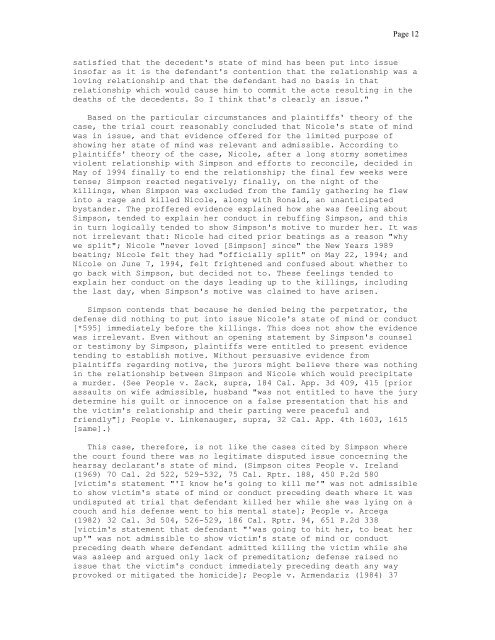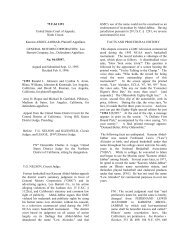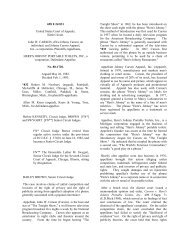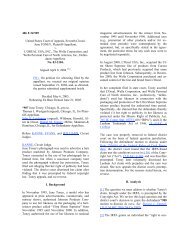Rufo v. OJ Simpson - Right Of Publicity
Rufo v. OJ Simpson - Right Of Publicity
Rufo v. OJ Simpson - Right Of Publicity
Create successful ePaper yourself
Turn your PDF publications into a flip-book with our unique Google optimized e-Paper software.
Page 12<br />
satisfied that the decedent's state of mind has been put into issue<br />
insofar as it is the defendant's contention that the relationship was a<br />
loving relationship and that the defendant had no basis in that<br />
relationship which would cause him to commit the acts resulting in the<br />
deaths of the decedents. So I think that's clearly an issue."<br />
Based on the particular circumstances and plaintiffs' theory of the<br />
case, the trial court reasonably concluded that Nicole's state of mind<br />
was in issue, and that evidence offered for the limited purpose of<br />
showing her state of mind was relevant and admissible. According to<br />
plaintiffs' theory of the case, Nicole, after a long stormy sometimes<br />
violent relationship with <strong>Simpson</strong> and efforts to reconcile, decided in<br />
May of 1994 finally to end the relationship; the final few weeks were<br />
tense; <strong>Simpson</strong> reacted negatively; finally, on the night of the<br />
killings, when <strong>Simpson</strong> was excluded from the family gathering he flew<br />
into a rage and killed Nicole, along with Ronald, an unanticipated<br />
bystander. The proffered evidence explained how she was feeling about<br />
<strong>Simpson</strong>, tended to explain her conduct in rebuffing <strong>Simpson</strong>, and this<br />
in turn logically tended to show <strong>Simpson</strong>'s motive to murder her. It was<br />
not irrelevant that: Nicole had cited prior beatings as a reason "why<br />
we split"; Nicole "never loved [<strong>Simpson</strong>] since" the New Years 1989<br />
beating; Nicole felt they had "officially split" on May 22, 1994; and<br />
Nicole on June 7, 1994, felt frightened and confused about whether to<br />
go back with <strong>Simpson</strong>, but decided not to. These feelings tended to<br />
explain her conduct on the days leading up to the killings, including<br />
the last day, when <strong>Simpson</strong>'s motive was claimed to have arisen.<br />
<strong>Simpson</strong> contends that because he denied being the perpetrator, the<br />
defense did nothing to put into issue Nicole's state of mind or conduct<br />
[*595] immediately before the killings. This does not show the evidence<br />
was irrelevant. Even without an opening statement by <strong>Simpson</strong>'s counsel<br />
or testimony by <strong>Simpson</strong>, plaintiffs were entitled to present evidence<br />
tending to establish motive. Without persuasive evidence from<br />
plaintiffs regarding motive, the jurors might believe there was nothing<br />
in the relationship between <strong>Simpson</strong> and Nicole which would precipitate<br />
a murder. (See People v. Zack, supra, 184 Cal. App. 3d 409, 415 [prior<br />
assaults on wife admissible, husband "was not entitled to have the jury<br />
determine his guilt or innocence on a false presentation that his and<br />
the victim's relationship and their parting were peaceful and<br />
friendly"]; People v. Linkenauger, supra, 32 Cal. App. 4th 1603, 1615<br />
[same].)<br />
This case, therefore, is not like the cases cited by <strong>Simpson</strong> where<br />
the court found there was no legitimate disputed issue concerning the<br />
hearsay declarant's state of mind. (<strong>Simpson</strong> cites People v. Ireland<br />
(1969) 70 Cal. 2d 522, 529-532, 75 Cal. Rptr. 188, 450 P.2d 580<br />
[victim's statement "'I know he's going to kill me'" was not admissible<br />
to show victim's state of mind or conduct preceding death where it was<br />
undisputed at trial that defendant killed her while she was lying on a<br />
couch and his defense went to his mental state]; People v. Arcega<br />
(1982) 32 Cal. 3d 504, 526-529, 186 Cal. Rptr. 94, 651 P.2d 338<br />
[victim's statement that defendant "'was going to hit her, to beat her<br />
up'" was not admissible to show victim's state of mind or conduct<br />
preceding death where defendant admitted killing the victim while she<br />
was asleep and argued only lack of premeditation; defense raised no<br />
issue that the victim's conduct immediately preceding death any way<br />
provoked or mitigated the homicide]; People v. Armendariz (1984) 37







